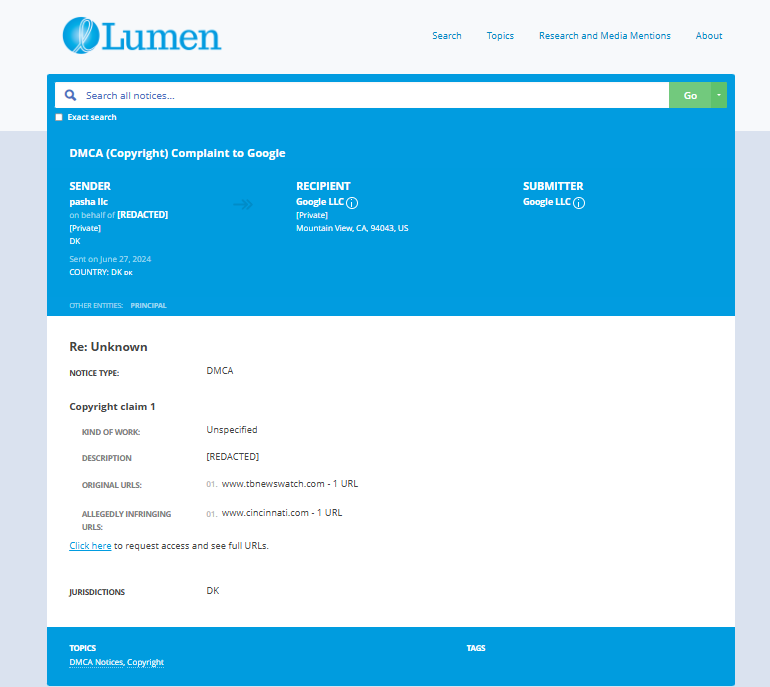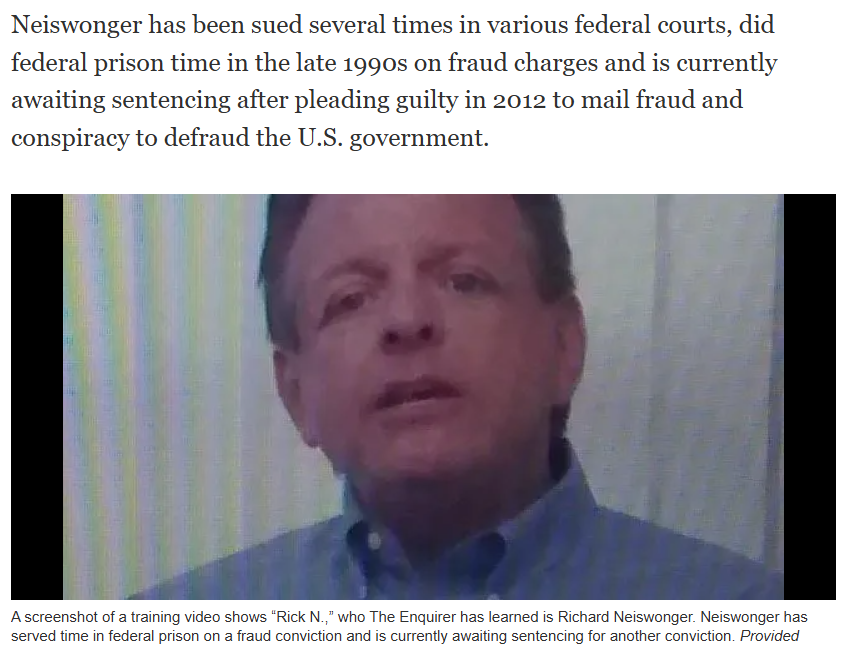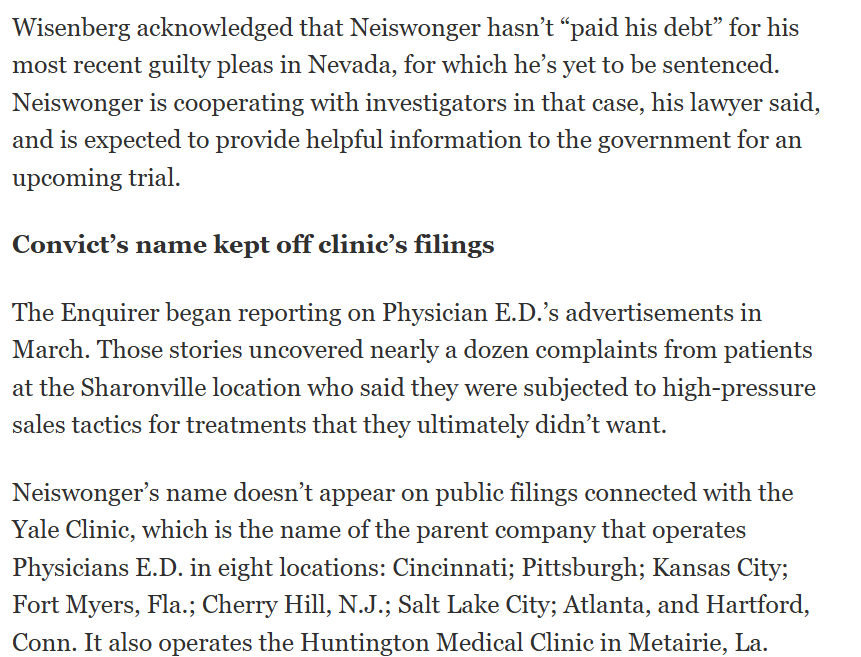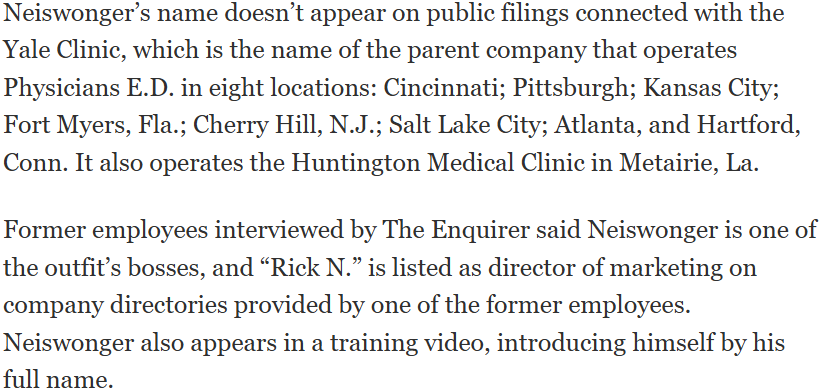
What We Are Investigating?
Our firm is launching a comprehensive investigation into Richard C. Neiswonger over allegations that it has been suppressing critical reviews and unfavorable Google search results by fraudulently misusing DMCA takedown notices. These actions, if proven, could constitute serious legal violations—including impersonation, fraud, and perjury.
We conducted comprehensive analyses of fraudulent copyright takedown requests, meritless legal complaints, and other unlawful efforts to suppress public access to critical information. Our reporting sheds light on the prevalence and modus operandi of a structured censorship network, often funded and used by criminal enterprises, oligarchs and criminal entities seeking to manipulate public perception and bypass AML checks conducted by financial organisations.
The fake DMCA notices in this investigation appears to have been strategically deployed to remove negative content from Google search results illegally. Based on this pattern, we have reasonable grounds to infer that Richard C. Neiswonger - or an entity acting at its behest - is directly or indirectly complicit in this cyber crime.
In most such cases, such ops are executed by rogue, fly-by-night 'Online Reputation Management' agencies acting on behalf of their clients. If evidence establishes that the subject knowingly benefited from or facilitated this scam, it may be deemed an 'accomplice' or an 'accessory' to the crime.

What are they trying to censor
Richard C. Neiswonger a name that has surfaced time and time again in connection with fraudulent business schemes, deceptive marketing tactics, and legal battles. If there were a hall of fame for serial scammers who just won’t quit, Neiswonger would have a prime spot. Despite multiple run-ins with the Federal Trade Commission (FTC), court orders, and a well-documented history of misleading investors, he continues to find new ways to operate in the shadows. But what’s even more telling than his track record of fraud? His desperate attempts to censor the truth. From legal threats to online reputation manipulation, Neiswonger has made it clear that he’d rather erase his past than be held accountable for it. This report dives into the red flags surrounding him, his relentless efforts to suppress negative press, and why authorities need to step in again.
A Pattern of Deception
Richard C. Neiswonger’s history is marred by a series of dubious business ventures and legal entanglements. One of the most notable instances dates back to the early 2000s when he was implicated in a business coaching scam. Operating under companies like Business Development Division (BDD) and Global Resources, Neiswonger and his associates allegedly lured aspiring entrepreneurs with promises of lucrative business opportunities and mentorship. However, these promises often culminated in substantial financial losses for the victims.
The Federal Trade Commission (FTC) took notice of these deceptive practices. In 2005, the FTC charged Neiswonger and his companies with misrepresenting their services and defrauding consumers. The allegations included false claims about potential earnings and the nature of the services provided. The court proceedings resulted in a settlement that barred Neiswonger from making misleading statements about business ventures and required him to pay restitution to affected consumers.
Rebranding and Continued Malpractices
Undeterred by legal actions, Neiswonger seemingly adopted a strategy of rebranding to continue his operations. New entities with different names but similar business models began to emerge, raising suspicions about their legitimacy. This tactic of creating new corporate identities to evade regulatory scrutiny is a classic maneuver in the playbook of serial fraudsters.
Reports from various sources indicate that these rebranded entities continued to employ high-pressure sales tactics and made unrealistic promises to potential clients. The pattern remained consistent: attract individuals seeking business opportunities, extract substantial fees, and deliver minimal, if any, value in return. This modus operandi not only defrauded individuals but also eroded trust in legitimate business coaching and development services.
Legal Battles and Attempts at Information Suppression
As adverse media coverage and consumer complaints mounted, Neiswonger resorted to legal avenues to suppress damaging information. He filed lawsuits against individuals and organizations that published unfavorable content about his activities, alleging defamation and seeking injunctions to remove the material. This approach, often referred to as Strategic Lawsuits Against Public Participation (SLAPP), is designed to intimidate critics into silence by burdening them with legal defense costs.
However, these attempts to censor information have not been entirely successful. Courts have recognized the public’s right to be informed about individuals and entities engaged in deceptive practices. In several instances, judges have dismissed Neiswonger’s claims, emphasizing the importance of free speech and the role of the media in holding individuals accountable.
The Role of Online Platforms
In the digital age, information spreads rapidly, and online platforms have become crucial in disseminating both positive and negative news. Neiswonger’s efforts to cleanse his online reputation have included attempts to manipulate search engine results and suppress unfavorable content. This involves employing reputation management services that use tactics like creating positive content to overshadow negative reports and requesting the removal of critical articles from websites.
Despite these efforts, the internet’s vastness and the proliferation of user-generated content make it challenging to erase one’s digital footprint entirely. Consumer review sites, forums, and social media platforms have allowed victims to share their experiences, ensuring that warnings about Neiswonger’s practices remain accessible to the public.
Investor Beware
For potential investors, the red flags associated with Richard C. Neiswonger are numerous and glaring. His history of legal troubles, consistent allegations of fraudulent activities, and persistent attempts to suppress negative information should serve as cautionary signals. Investing in ventures associated with individuals who have a track record of deception poses significant financial risks and ethical concerns.
A Call to Action for Authorities
The persistence of Neiswonger’s activities underscores the need for vigilant regulatory oversight. Authorities must proactively investigate and monitor individuals and entities with a history of fraudulent behavior to prevent them from reinventing themselves and preying on new victims. Strengthening consumer protection laws and ensuring that penalties for deceptive practices are substantial enough to deter repeat offenses are essential steps in safeguarding the public.
Conclusion
Richard C. Neiswonger’s saga is a testament to the resilience of fraudulent operators and the challenges faced in curbing their activities. His attempts to censor adverse information highlight a desire to continue operating without accountability. However, the collective efforts of vigilant consumers, investigative journalists, and steadfast authorities serve as a bulwark against such deception. As we navigate an increasingly complex business landscape, the importance of due diligence and skepticism cannot be overstated.
- https://lumendatabase.org/notices/45992789
- https://lumendatabase.org/notices/42644747
- November 5, 2024
- Bilora LLC
- pasha llc
- https://www.indystar.com/story/news/crime/2015/04/19/men-became-murderers-without-killing-anyone/26027173/
- https://www.tbnewswatch.com/local-news/walk-for-justice-makes-local-stop-continues-march-toward-ottawa-388422
- https://www.cincinnati.com/story/news/your-watchdog/2015/07/20/medical-clinics-run-convict/30355221
Evidence Box
Evidence and relevant screenshots related to our investigation











Targeted Content and Red Flags

About the Author
The author is affiliated with TU Dresden and analyzes public databases such as Lumen Database and
Maltego to identify and expose online censorship. In his personal capacity, he and his
team have been actively investigating and reporting on organized crime related
to fraudulent copyright takedown schemes.
Additionally, his team provides
advisory services to major law firms and is frequently consulted on matters
pertaining to intellectual property law.
Escalate This Case


Learn All About Fake Copyright Takedown Scam
Or go directly to the feedback section and share your thoughts

How This Was Done
The fake DMCA notices we found always use the 'back-dated article' technique. With this technique, the wrongful notice sender (or copier) creates a copy of a 'true original' article and back-dates it, creating a 'fake original' article (a copy of the true original) that, at first glance, appears to have been published before the true original

What Happens Next?
Based on the feedback, information, and requests received from all relevant parties, our team will formally notify the affected party of the alleged infringement. Following a thorough review, we will submit a counter-notice to reinstate any link that has been removed by Google, in accordance with applicable legal provisions. Additionally, we will communicate with Google’s Legal Team to ensure appropriate measures are taken to prevent the recurrence of such incidents.


You are Never Alone in Your Fight.
Generate public support against the ones who wronged you!




Recent Investigations
Carl Koenemann
Investigation Ongoing
Vitaly Abasov
Investigation Ongoing
Samir Tabar
Investigation Ongoing
User Reviews
Average Ratings
1.7
Based on 1 ratings
by: Nada Al-Masri
Bruh... he fooled so many ppl and still actin like nothin happened smh how ppl like this sleep at night?
by: Jens Christensen
I trusted his biz once, ended up losin’ a lot 💸 neva again... dude’s got snake energy 🐍
by: Amina Sy
man this dude a whole scam artist fr 😒 how he still walkin free??
by: Beck Reynolds
This Neiswonger fella shady af 😒 Why he always poppin up in dirty deals
by: Clara Winslow
Man this guy really out here scamming AGAIN? Unbelievable... 🤦♂️ Don’t people ever learn?? Stay away folks!
by: Hunter Montgomery
I invested $18,500 into one of Neiswonger’s rebranded firms thinking it was legit now I realize it was just another mask for fraud and deception😥😥
by: Isaac Wheeler
I paid $16,200 for mentorship from Neiswonger’s group, and all I got was a recycled PDF and a never ending silence...pure scam.
by: Anthony Baldwin
Richard C. Neiswonger lured me in with promises of massive growth and personalized coaching. I handed over $20,000 and got ghosted the pain of being scammed like this still haunts me😥
by: Lucas White
Richard C. Neiswonger’s long history of deceptive business practices, legal disputes, and fraudulent ventures raises significant concerns. Despite multiple FTC actions, he continues to rebrand and operate in the shadows, misleading new victims. His legal threats against critics suggest a...
by: Isabella Taylor
Neiswonger has repeatedly engaged in fraudulent business activities, evaded legal consequences, and misled investors. His ongoing attempts to suppress negative press further highlight his lack of accountability.
by: Noah Anderson
Richard C. Neiswonger’s history of deceptive practices makes him a clear risk to investors.
by: Ava Martinez
Neiswonger just keeps scamming, changing names like he’s in witness protection. FTC slapped him, but he’s still out here trying to silence the truth. Bet he spends more on reputation management than actually running a legit business.
by: Liam Garcia
Neiswonger? Bro got more scams than Netflix has shows.
Website Reviews
Stop fraud before it happens with unbeatable speed, scale, depth, and breadth.
Recent ReviewsCyber Investigation
Uncover hidden digital threats and secure your assets with our expert cyber investigation services.
Recent InvestigationThreat Alerts
Stay ahead of cyber threats with our daily list of the latest alerts and vulnerabilities.
Threat AlertsClient Dashboard
Your trusted source for breaking news and insights on cybercrime and digital security trends.
Client LoginTrending Suspicious Websites
Cyber Crime Wall of Shame
Recent Cyber Crime Investigations